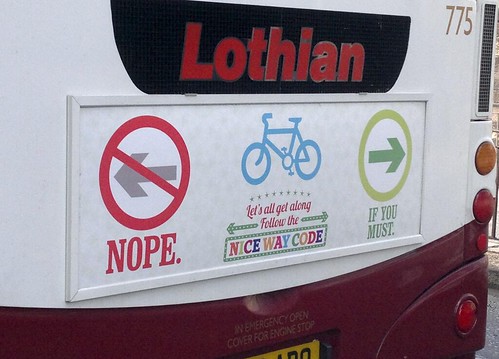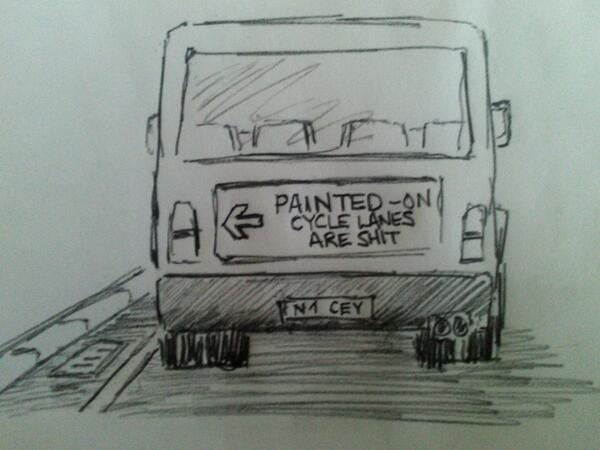Imagine a place suffering from congestion problems due to too many people trying to drive vehicles many times the size of themselves.
Imagine a place that is an
air quality action area, due to the pollution generated by all those motor vehicles.

Imagine a place with parking problems due to the sheer number of cars trying to park -even for short journeys like a trip to local shops.
Imagine a place with health problems due to the inactivity of the population, where obesity is a growing crisis, where physical exercise has been negleted so long that the residents cannot even walk short distances from where they park, where such problems are not treated with exercise, but rewarded with disabled parking stickers that actualy make it easier to park outside your destination, and free parking is needed for those people who aren't quite there: "There are an awful lot of people who are not disabled enough to qualify for a parking badge and therefore a disabled space, but nevertheless they are not terribly mobile.
Imagine a place where "more civilised" places nearby look on in sadness and despair: how can this place not realise that they have painted themseves into a corner -that their dependency on driving has now created the problems: congestion, pollution, parking -problems which can begin to be fixed if they could get even a small fraction of the people who currently drive. When asked "why don't you follow their examples", the response is invariably some form of
"we are different"
Imagine a place where existing cycling facilities are of awful quality and nowhere where people would actually want to go -yet the response to anyone suggesting "add more cycling facilities" is "but the cyclists aren't using the ones they've already got".
Where to take any space away from cars is considered a line that cannot be crossed:
"not giving up two free spaces period", because
"it's not fair for others"

Imagine a place where those people with the health and obesity problems, the ones who drive everywhere, are unable to recognise that they have options to get around, that rather than view cyclists as "them", they should consider it themselves.
Imagine a place that when the people and their leaders asked why they are not following the lead of the "more civilised places", the response is "we are not like them"
Imagine a place when pressured to put in more cycling facilities, the leaders respond with some empty words that while implying to be supportive of the idea, make it clear that they will not fund anything, that nothing will be done.
Imagine a place where the leaders say that while they support cycling, they have to take into account the needs of "all road users", by which they mean the people who drive, take up the most space, and endanger the lives of everyone trying to cycle -to the extend that they effectively supress cycling.
Imagine a place that is happy to spend money on improving driving, creating "solutions" to traffic problems that merely delay congestion for a few years, but by reinforcing the idea that driving is the way to get round, amplifying pollution and parking problem and making it worse to walk and cycle.
Imagine a place where it is considered dangerous to let the children out to play or walk to school because of the way everyone drives -the school run then creating more congestion and more dangerous for anyone trying to be different.
Imagine a place where the metric of suppressed cycling is
the presence of the no-cycling signs on the few places where people can safely cycle.

What is that place?
1. Scotland
2. England and wales
3. S Gloucs
4. Marlborough
5. All of the above
The answer is, of course:
all of the above.
For Scotland and England, the "more civilised" places are of course the rest of Europe -not just Amsterdam and Copenhage, but Dublin and Paris.
For S gloucs, the more civilised place is Bristol.
For Malrlborough, the more civilised place is maybe somewhere like Oxford.
It is the same problem across the board. The population has painted themselves into a corner -their choice of transport is not only poisoning the cities it is slowly killing the people who use it, and rapidly killing the people who try to lead a better life.
Marlborough and S Gloucs are simply a fraction of the country-wide ; delve down into individual streets and you will find that how people drive and park in their own roads makes it dangerous for children to play outside their own houses, when they want to visit friends two streets over their parents drive them for fear of their lives.
These are our villages, our towns, our cities and our countries, and they are the process of slowly committing suicide, while any attempt to say "
it doesn't have to be this way", is treated with derision, patronising comments and utter inaction.
It's politicians saying fatuous bollocks and doing fuck all -all the way down
This raises an interesting question: how to change things? It's easy to say: focus on the bits that are changing, the inner cities. But why should the places that are theoretically the most dangerous : the busy city with the most people, the delivery vans, the taxis and the buses -the places where cycling is taking off? While the "leafy" suburbs, the dormitory towns, the market towns, the rural villages are getting worse? Because they are. And it is the people who live in them, who drive everywhere, who expect parking to be free and available wherever they go who are the ones we need to change.
We need to change their behaviour. How they get round a city. If they want to cycle, they need to be helped to get around safely -for them to be able to do the school run with their children alive, for them to send their kids out to play without worrying every time they hear a car speed by, where when they send a kid to see a friend round the corner they phone ahead to say "they are coming", and have the far end call in "they've arrived" when it happens.
How to do this? PoP has shown that the Scottish government isn't going to care about thousands of people turning up on bicycles, instead they issue fatuous words of inaction, targets delegated to others, wilful ingorance of safety statistics showing that Scotland is getting more dangerous to walk or cycle round.
The UK spending revew has shown that the English government isn't going to care about thousands of people signing petitions, national paper campaigns, parliamentary groups or warnings from the NHS. Instead they issue fatuous words of inaction, targets delegated to others, wilful ingorance of safety statistics showing that London is getting more dangerous to walk or cycle round.
This goes all the way down from the UK government, to regional govts, to county councils, towns stuck in the dark ages, to streets who complain about how cyclists threaten them, and how penalising them for driving in bus lanes is "persecution".
We need to keep that pressure up the councils -to let them know that their patronising bollocks is just that, that the data is at odds with their claims, that we wont accept the shit that they expect us to be grateful for.
But it isn't going to be enough unless they think they will be penalised at the polls for their inaction.
Press helps here: if the councillors realise there is popular support for change, they may change. The problem here is that those little local papers love local conflict, and cars v bikes makes for popular vitrol. Same for those regional TV news channels that like their phone ins. They'd rather see controversy over change -which is where the Times, the Evening Standard and the Glasgow Herald have to be praised for moving beyond this.
We also need to get out and protest about dismissive legal penalties, where judges forgive drivers for killing people, "a mistake anyone could make", when they impose penalties that are a joke. Whenever a judgement comes in, we need to get out to the court in our bicycles, be ready with quotes and again, that press.
If change isn't going to happen from the top, it has to come from below.
Organisations like Transition Marlbough can focus on the local issues, but its clear that they are still viewed as "troublemakers", not parts of the general population. Idealists; sweet but naive. What else?
Lower down: Street by street. School by school. Workplace by workplace.
Cycle to work looking normal -and offer support to anyone who also wants to do it, emphasise the time savings in the car, the money saved from the drive and the gym.
Cycle to school with the kids -offer support for other parents, and try and do it in convoy -as if a group of parents can marshall the kids, everyone will be happier. Try and get the school to do something about the parents who drive and make that final 300 metres, the school zone, the most hazardous.
Because that is all we have left -and because a more of the population spend even a little time on a bicycle, benefits will accrue
- They will stop viewing those who cycle as outsiders who can be treated as expendable
- Their friends and neighbours will stop viewing those who cycle as outsiders who can be treated like shit
- The more people who cycle on the school run, it will make the school run safer for everyone who walks or cycles
- If congestion and parking problems can be visibly reduced, it validates the fact that people on biycles take up less space, cause no pollution, can provide tangible benefits to the city.
We do need to get those councillors on board and the policitians. They need to get on a bicycle so they can stop talking about
"the danger to motorists from cyclists backing out of cycle hoops at the side of the road. so they can stop with the "safe if you keep your wits about you" quotes, so that they can appreciate the benefits themselves.
Every cycling group needs to get in touch with their local councillor and offer to take them on a bike tour round the city. They need to contact their transport planners and offer to take them round an problem area by bike -to make the issues more tangible.
Because if we don't get out there, to do the groundwork and get their neighbours to the shops by bike, to do the school run by bike, then the fatuous politicans will continue to issue press release containing fatuous bollocks.
Arise! The politicans will have to adapt or die!






 What is that place?
What is that place?